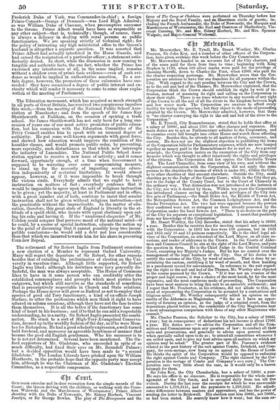The Education movement, which has acquired so much strength in
all parts of Great Britain, has received two conspicuous impulses this week,—from the meeting of the National Public School Asso- ciation at Manchester ; and from the speech of Sir James Kay Shnttleworth at Padiham, on the occasion of opening a trade school. Sir James Shuttlewurth has not only been for a long suc- cession of years one of our most active promoters of public educa- tion, but his connexion with the Education Committee of the Privy Council enables him to speak with an unusual degree of authority. He put some well-known arguments with great force, and showed how education would improve the condition of the humbler classes, and would promote public order, by preventing, more especially, such disturbances as that which now interrupts the industry of Lancashire. The National Public School Asso- ciation appears to receive a new lease of activity ; and it conies forward, opportunely enough, at a time when Government is supposed to be wavering over some compromising measure, to stand up for the necessity of imparting secular educa- tion independently of sectarian limitations. It would almost appear, however, as if it were impossible to break through the vicious circle. Everybody admits that we ought to have instruction on matters of fact ; everybody confesses that it would be impossible to agree upon the sort of religious instruction to be given; yet the majority, at least in Parliament and in office, with a great number out of both, continue to insist that secular instruction shall not be given without religious instruction—not the practicable without the impracticable. In the matter of edu- cation, therefore, this great state of England is literally in the at- titude of a spoilt child, who insists with equal obstinacy upon eat- ing his cake and having it. If the " unadorned eloquence " of Mr. Cobden could conquer that perverse mood of the national mind—if he could, by a course of special instruction, educate the nation up to the point of discerning that it cannot possibly keep two incom- patible conclusions—he would add a debt not less considerable than that which we incurred towards him for his share in procuring Corn-law Repeal.


































 Previous page
Previous page